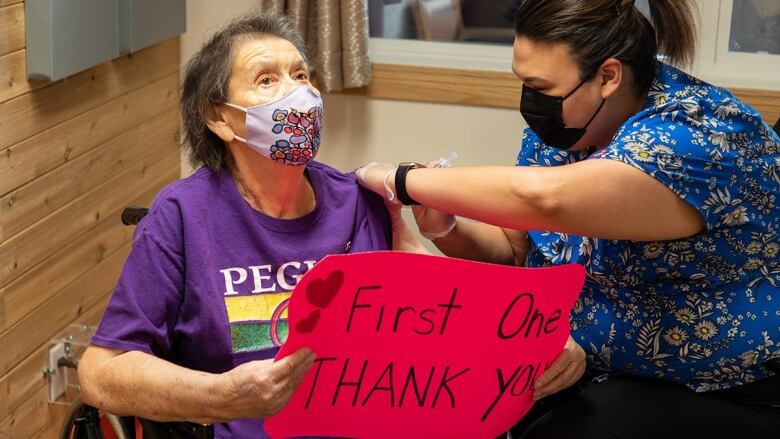Manitoba spends $2.8M to boost vaccination rates among urban Indigenous population
'Remarkable, remarkable success' of First Nations leadership to increase uptake: Dr. Marcia Anderson

Manitoba is spending $2.8 million to increase COVID-19 vaccination rates among First Nations, Mtis and Inuit people living in the province's cities.
The funding, announced Friday, will helpexpand the role of urban Indigenousvaccineclinics and other outreach effortsin neighbourhoods with lower vaccine uptake.
Most Winnipeg neighbourhoods have vaccination uptake rates of 85-88 per cent, according to the province's online vaccination dashboard.
The exceptions are Point Douglas, at 77.4 per cent, and downtown, at 80.3 per cent.
Friday's announcement was made at Thunderbird House in Winnipeg byPremier Kelvin Goertzen, Health Minister Audrey Gordon and Indigenous Reconciliation and Northern Relations Minister Alan Lagimodiere,in partnership with the Assembly of Manitoba Chiefsand Manitoba Keewatinowi Okimakanak.
David Monias, MKO vice-chief, urged people to take advantage of the clinics and get their vaccinations, proudly declaring himself double-vaxxed.
"A few months ago I said that COVID does not discriminate. I'm here to tell you, I learned a lot from society, it does discriminate," Monias said.
"It discriminates against the weak, against the people who have compromised body immune systems, [and] it discriminates against people who are not vaccinated."
Further, the unvaccinated pose a risk to children as well as to their own families and communities, he said.
In addressing those who have protested against mandatory vaccinations, Monias said he respects the Charter of Rights and Freedoms,"but we hold in higher esteem our responsibility to our children, our responsibility to our families, our responsibility to our communities, our responsibility to the nation."
Immunization clinics extended
The lion's share of the money announced Friday$2.1 million willextend immunization clinics at the Aboriginal Health and Wellness Centre and Ma Mawi Wi Chi Itata Centre locations in Winnipeg until December. Those clinics will now be open to all members of the community,not just Indigenous people.
"This will help ensure another COVID-19 immunization option is available to people who might otherwise face barriers in being immunized at other locations," the province said in a news release.
Those clinics will also offer seasonal influenza vaccines this fall and provide youth catch-up immunizations for anyone who missed regular vaccines at school over the last two years.
Another$250,000 is going tothe sameorganizations to operate a mobile immunization clinic over the next several months in Winnipeg's downtown and Point Douglas neighbourhoods, including door-to-door outreach.
Della Herrera, executive director of the Aboriginal Health and Wellness Centre, said anoutreach team involving her group and sister agencies likeMa Mawiand Main Street Projecthasbeen taking vaccine education "to our relatives on the street" for monthsin order to boost uptake.
The funding announced Friday will help strengthen that effort,she said.
"To date we have visited over 60 [homeless] encampments. Our goal is to visit every encampment, under-the-bridge communityand as many populated meetinghubs as we can over the next three months," she said.
The money will alsoallow the groups toprovide QR codes and vaccine cards to the city's unsheltered community, Herrera said.
"We want our relatives and community to be afforded the same access as everyone else."
The remaining funds from the province will be spent as follows:
- $347,000 to extend immunization clinics at the Portage la Prairie Renewal Corporation, Ma-Mow-We-Tak Friendship Centre in Thompson and Brandon Friendship Centre in Brandon until December 2021.
- $65,000 for a new staff position atOngomiizwin Health Services toact as a liaison between the provincial vaccine implementation task force, Indigenous governance organizations and vaccine service providers.
- $33,000 to support the immunization clinics held earlier this year by the Manitoba Inuit Association.
To date, more than 58,200 COVID-19 vaccines have been administered at the five urban Indigenous clinics in Manitoba, the province said.
AMC Grand Chief Arlen Dumas said those clinicsensure that urban and off-reserve First Nations people are fully immunized in a "culturally safe and barrier-free setting."
'Remarkable success of First Nations leadership'
Vaccine uptake in other Manitoba cities is closer to the low end in Winnipeg. Portage la Prairie is at77.6 per cent while its surrounding rural area is at 67.4 per cent. Brandon is at 83.5 and the area around it is between 75.4 and 81.8 per cent.
Thompson is at 80.3 but the surrounding areas are actually much higher, with vaccine uptake between 84 and 91 per cent.
That doesn't surpriseDr. Marcia Anderson, the public health lead for the Manitoba First Nations pandemic response team. Those surrounding areas are Indigenous communities and as of Thursday, vaccine coverage for First Nations people living on reserve is over 90 per cent, she said.
WATCH | Dr. Marcia Anderson on decline innumber of First Nations patients in hospital:
She credits leaders on reserves for embracingvaccines as soon as they were available. In contrast, vaccination ratesfor off-reserve First Nations people laggedinitiallybecause of accessibility and a lack of trust by that community inthe public health system.
The urban Indigenous clinics didn't open until April so it took longer to leverage the same Indigenous leadership in the urban environment, Anderson said.
During the early part of the pandemic, 50 to 60 per cent of the COVID patients in hospital or intensive care units were First Nations people, she noted. But those clinics are now making a vast difference.
As of Thursday, only 16 per cent of people in the hospital with COVID-19wereFirst Nations and there is only one First Nations person inICU, Anderson said.
"This is a remarkable, remarkable success of First Nations leadership and First Nations health and, of course, the safety and effectiveness of COVID-19 vaccines."
As of Friday,a total of 84.6 per cent of eligible Manitobans have had one dose of a COVID-19 vaccine and 79.9 per cent have had two, the online vaccination dashboard says.
Anyone born on or before Dec. 31, 2009, is eligible for a vaccine in Manitoba.













_(720p).jpg)


 OFFICIAL HD MUSIC VIDEO.jpg)
.jpg)



























































































